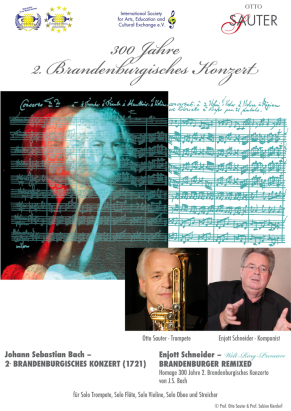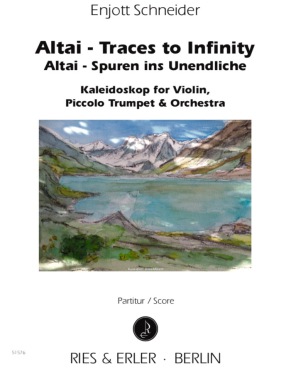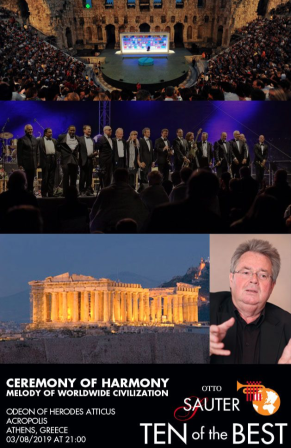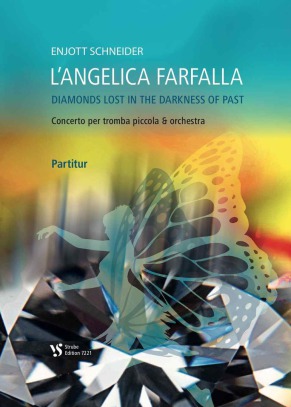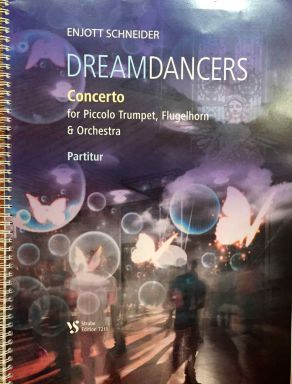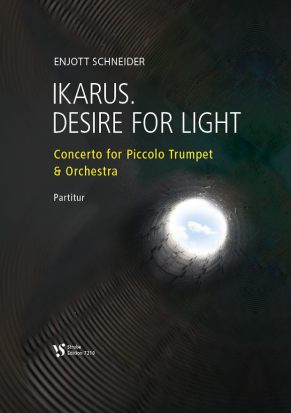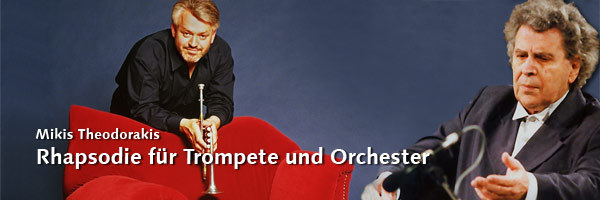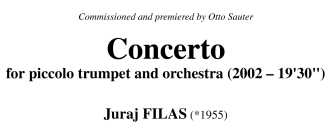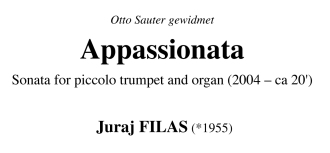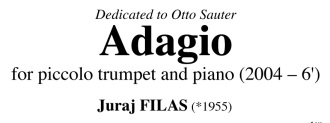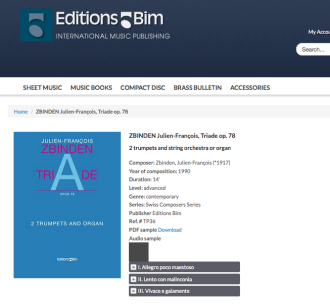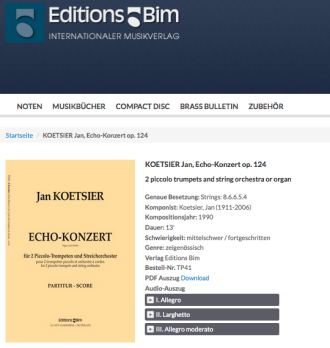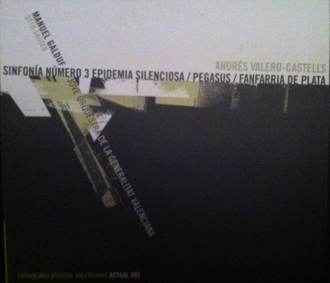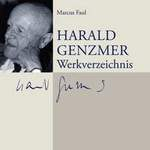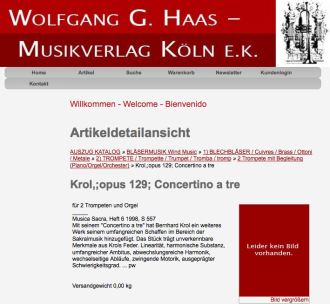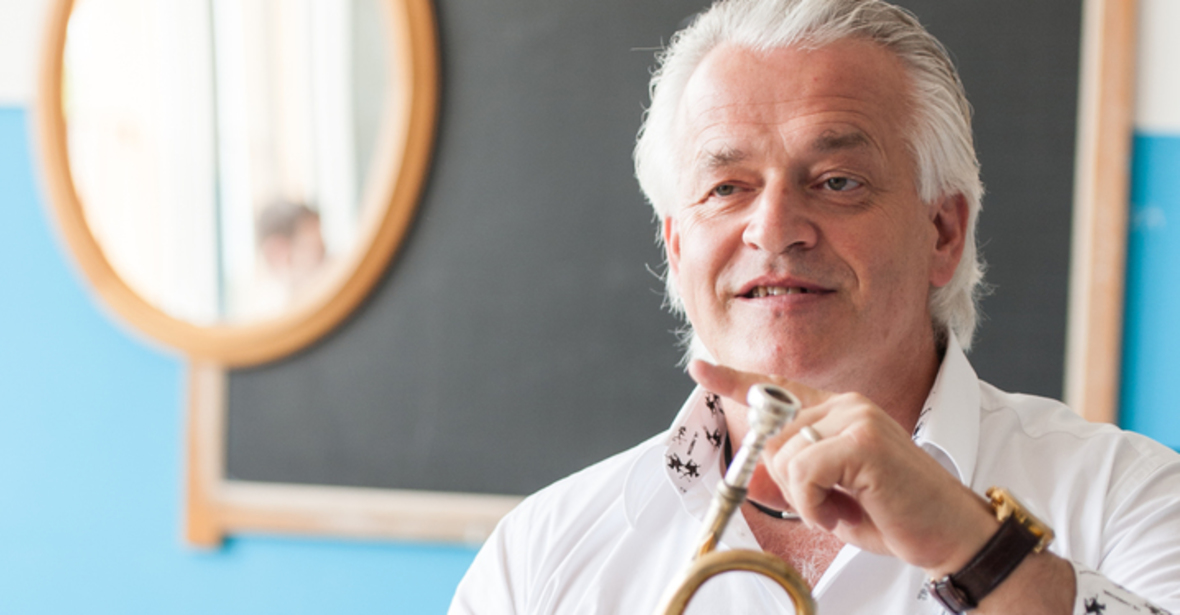

Programme
Deutsch
Piccolo-Trompeten Konzerte (Auswahl)
+ Sinfonie Orchester
ENJOTT SCHNEIDER
Ikarus, Desire for Light, Konzert für Piccolo Trompete &
Sinfonie Orchester des deutschen Komponisten Enjott
Schneider für Otto Sauter - Welt Uraufführung: 2016 Amazon
Opera House in Manaus/Brazil als Ringuraufführung gefolgt von Teheran, Istanbul, Kiew,
Philadelphia, Danzig in Kooperation mit der World & European Brass
Association
MIKIS THEODORAKIS
Rhapsodie für Piccolo-Trompete & Sinfonie Orchester des
großen griechischen Komponisten geschrieben für Otto
Sauter - Weltringuraufführung 2008 Philharmonie Berlin und
Köln
JURAI FILAS
Konzert für Piccolo-Trompete und Sinfonie Orchester des
tschechischen Komponisten Jurai Filas für Otto Sauter
Welturaufführung - Beethovenfest Bonn mit dem Beethoven
Orchester Bonn unter der Leitung von Roman Kofman
+ Kammerorchester
Mit u.a. wiederentdeckten Werken* für Trompete aus der
privaten Sammlung von Otto Sauter, die seit über 250 Jahren
zum ersten Mal wieder aufgeführt werden.
DIE TROMPETE AN DEUTSCHEN HÖFEN
(wiederentdeckte Werke*) (Auswahl)
Werke von u.a.:
J.S. Bach: Brandenburgisches Konzert II,
F. X. Richter: Konzert in D-Dur,
J. W. Hertel: Konzerte 1-3,
J.M. Molter: Konzerte 1-3,
L. Otto: Konzert in ES-Dur* (mit Quartett Begleitung mgl.),
Laue: Konzert in D-Dur* (mit Quartett Begleitung mgl.),
J. S. Endler: Sinfonien in D-Dur*, Es-Dur*, F-Dur*,
J. Riepel: Konzert in D-Dur*,
J. Stamitz: Konzert in D-Dur*,
G. Ph. Telemann: Concert in D-Major (mit Quartett Begleitung
mgl.)
DIE TROMPETE IN WIEN UND SALZBURG
(wiederentdeckte Werke*) (Auswahl)
Werke von u.a.:
L. Mozart: Konzert in D-Dur,
M. Haydn: Konzert Nr. 1 in D-Dur und Nr. 2 in C-Dur,
G. von Reutter: Konzert Nr.1 in C-Dur,
G. von Reutter: Konzert Nr. 2 in D Dur,
F. Querfurth: Konzert in Es Dur*,
J. G. Albrechtsberger: Concertino in Es Dur,
H. I. Biber, G. Reutter*, J.J. Fux*, F. Tuma*
+ Altus und Kammerorchester
(wiederentdeckte Werke*) (Auswahl)
Arien von u.a.:
Predieri*, Porsile*, A. Caldara*, G. Reutter*
+ Sopran und Kammerorchester
(wiederentdeckte Werke*) (Auswahl)
Arien von u.a.:
A. Scarlatti*, G. Wagenseil*, A. Caldara*, J.J. Fux*
+ Orgel
RENDEZ VOUS ROYAL (Auswahl)
Die Königin der Instrumente trifft das Instrument der Könige
Werke von u.a.:
J. S. Bach: Sonate Es-Dur,
A. Vivaldi: Concerto in G-Dur,
T. Albinoni: Adagio,
G. F. Händel: Sonate in D-Dur
G. Ph. Telemann: Sonate B-Dur
R. Valentino: Sonate in d-moll,
J. Filas: Appassionata und Adagio
Alphonso Albertin: Sonata à 4 organi, 4 clarini, 4 corny e
timpani (1787) wieder uraufgeführt
auf dem
Beethoven Bonn im Bonner Münster
Organ e.g.:
Johannes Skudlik (Landsberg am Lech),
Christian Schmitt (Saarbrücken),
Michael Schönheit (Gewandhaus zu Leipzig)
+ Schauspieler und Kammerorchester, Klavier oder Orgel
VENEZIANISCHE WEIHNACHT I & II
mit u.a. Schauspieler Michael Mendl
Venedig zur Weihnachtszeit in der Zuckerbäckerei Mendel auf
der Piazza San Marco - Weihnachtliche Geschichten und
Musik Werke von u.a. A. Vivaldi, A. Marcello und A. Corelli,
Geschichten von u.a. Goldoni, Dickens und Rilke
English
Piccolo Trumpet Concertos (extract)
+ Symphony Orchestra
ENJOTT SCHNEIDER
Ikarus, Desire for Light, Concert for Piccolo Trumpet &
Symphony Orchestra of the German Composer Enjott
Schneider for Otto Sauter - Worldringpremiere: 2016 Amazon
Opera House in Manaus/Brazil followed by Teheran, Istanbul,
Symphony Orchestra of the German Composer Enjott
Kiew, Philadelphia, Gdansk in cooperation with the World & Symphony Orchestra of the
German Composer Enjott
European Brass Association
MIKIS THEODORAKIS
Rhapsody for Piccolo Trumpet and Symphony Orchestra of
the renowned Greek composer, written for Otto Sauter - World
Ring Premiere 2008 Philharmony Berlin and Cologne
JURAI FILAS
Concert for Piccolo Trumpet and Symphony Orchestra
of the Czech composer Jurai Filas, written for Otto Sauter
World Premiere - Beethovenfest Bonn with the Beethoven
Orchester Bonn, conducted by Roman Kofman
+ Chamber Orchestra
with amongst others rediscovered works* for trumpet, that
where not performed for 250 years, belonging to the private
collection of Otto Sauter
THE TRUMPET AT GERMAN ROYAL COURTS
(rediscovered works*) (extract)
Works of e.g.:
J. S. Bach: Brandenburgisches Konzert No. II,
F. X. Richter: Concert in D-Major,
J. W. Hertel: Konzerte 1-3,
J. M. Molter: Concerts 1-3,
L. Otto: Concert in E-Flat Major* (quartet accompaniment
possible),
Laue: Concert in D-Major* (quartet accompaniment
possible),
J. S. Endler: Sinfonien in D-Dur*, Es-Dur*, F-Dur*,
J. Riepel: Concert in D-Major*,
J. Stamitz: Concert in D-Major*,
G. Ph. Telemann: Concert in D-Major (quartet
accompaniment possible),
THE TRUMPET AT VIENNA AND SALZBURG
(rediscovered works*) (extract)
Works of e.g.:
L. Mozart: Concerto in D Major,
M. Haydn: Concerto No. 1 in D Major and No. 2 in C Major,
G. von Reutter: Concerto No.1 in C Major,
G. von Reutter: Concerto No. 2 in D Major,
F. Querfurth: Concerto in E flat Major*,
J. G. Albrechtsberger: Concertino in E flat major
H. I. Biber, G. Reutter*, J.J. Fux*, F. Tuma*
+ Countertenor and Chamber Orchestra
(rediscovered works*) (extract)
Arias of e.g.:
Predieri*, Porsile*, A. Caldara*, G. Reutter*
+ Soprano and Chamber Orchestra
(rediscovered works*) (extract)
Arias of e.g.:
A. Scarlatti*, G. Wagenseil*, A. Caldara*, J.J. Fux*
+ Organ
RENDEZ VOUS ROYAL (extract)
The Queen of the Instruments meets the Instrument of the
Kings
Works of e.g.:
J. S. Bach: Sonata in E flat Major,
A. Vivaldi: Concerto in G Major,
T. Albinoni: Adagio,
G. F. Händel: Sonata in D Major
G. Ph. Telemann: Sonata B Major
R. Valentino: Sonata in d minor,
J. Filas: Appassionata and Adagio
Alphonso Albertin: Sonata à 4 organi, 4 clarini, 4 corny e
timpani (1787) repremiered at the
Beethoven
Festival in the Münster Bonn
Organ e.g.:
Johannes Skudlik (Landsberg am Lech),
Christian Schmitt (Saarbrücken),
Michael Schönheit (Gewandhaus zu Leipzig)
Kompositionen für / Compositions for Otto Sauter
Enjott Schneider: BRANDENBURGER REMIXED coming in 2021
Komposition für / Composition for Otto Sauter
BRANDENBURGER REMIXED als eine “Hommage 300 Jahre Brandenburgisches Konzert Nr. 2 von J.S. Bach” stellt die Trompete in den Vordergrund, denn dieses zentrale Werk der Musikgeschichte darf als Mount Everest der Literatur für hohe Trompete gesehen werden. In der historisch exakten Besetzung werden Themen und Motive J.S. Bachs übernommen, weitergeführt und auch mit völlig andersartigem Tonmaterial kontrastiert. Mit den repetitiven Stilmittelns der modernen minimal music wird ein rhythmischer Grundpuls geschaffen, der an die aktuelle Technik des „Remix“ erinnert. Dadurch wird das Brandenburgische Konzert sozusagen verjüngt, gleichzeitig bleibt aber die konzertante Motorik und Vitalität des Originals erhalten. „Happy Birthday, Mr. Bach, - you are the greatest!“
BRANDENBURGER REMIXED as a "Homage 300 years Brandenburg Concerto No. 2 by J.S. Bach" sets the sound of trumpet in the foreground, because this central work of music history may be seen as the Mount Everest of literature for high trumpet. In the historically exact instrumentation, themes and motifs of J.S. Bach are taken over, continued and also contrasted with completely different sound material. With the repetitive stylistic devices of modern minimal music a rhythmic basic pulse is created, which reminds of the current technique of "remix". This rejuvenates the Brandenburg Concerto, and retains at the same time the concertante motor skills and vitality of the original. "Happy Birthday, Mr Bach, - you are the greatest!"
Instrumentation: Solo Trumpet - Solo flute - Solo violin - Solo oboe and strings
Enjott Schneider: Altai - Traces to Infinity / Spuren ins Unendliche
Komposition für / Composition for Otto Sauter (Ries & Erler Verlag, Berlin)
Ein Novum der Musikgeschichte, - das erste Konzert für Solovioline und Piccolotrompete. ALTAI – TRACES TO INFINITY ist inspiriert von der unendlichen Weite und Schönheit Kasachstans und seiner Ostbegrenzung hin zur Mongolei, China und Sibirien. ALTAI ist ein einzigartiges Naturwunder voller Mythen. Alle stark dem Wesen Kasachstans entnommenen Impressionen (wie etwa "Weite", "Pferderitt" oder "Adlerflug") sind flüchtig als „Kaleidoskop“ angeordnet: eine schillernde Vielfalt schnell wechselnder Stimmungen, in welche die beiden ungleichen Soloinstrumente Violine und Piccolotrompete in meist überraschenden Wendungen eintauchen.
ALTAI – TRACES TO INFINITY / SPUREN INS UNENDLICHE is inspired by the endless expanse and beauty of Kasachstan, situated between Caspian Sea and the Altai Mountains. Kasachstan is the ninth large state in the world in terms of area and for most of Europeans a unknown spot of earth. The Altai Mountains are a unique natural wonder full of myths. They are situated at the eastern border with heights up to 4500 meters and are the transition to Mongolia, China and Russia’s Siberia. The motifs and the musical material are partly modelled on traditional Kazakh music. The intervals, rhythms and melodic types of Kazakh folklore are very independent and of unbelievable richness. Some songs and dances were also quoted verbatim: for example the “Chant Shakerim” by Eli Erbalin, or the „Telkocyr – A foal with two Queens” by K. Klybayeva. They come from the collection of 19thcentury, which has become legendary for Kazakh music „500 kasakh Songs and Kyuis“ by Aleksandr V. Zataevich. All musical impressions are arranged very fleetingly as a “kaleidoscope”: no strict development of motifs, but a dazzling variety of rapidly changing moods. The two dissimilar solo instruments violin and piccolo trumpet dip into these moods in mostly surprising twists.
Duration: 22 Minuten
Besetzung / Orchestration:
Flute 1+2 I (2nd also Piccolo) - Oboe 1+2 (2nd also English Horn) - Clarinet 1+2 in Bb (2nd also Bass Clarinet in Bb) - Bassoon 1+2 - French Horns 1-3 in F - Timpani
- Percussion I (Triangle, Tamtam, metal chimes, large Bass Drum, small Tomtom) - Percussion II (Triangle, Glockenspiel, Vibraphone, 3 cymbals hanging, woodblock, hand drum (on a stand),
snare drum) - Large String Orchestra (14-12-10-8-6)
Solo instruments: Trumpet (B), Violin
Movements:
1: Endlessness of Montains / Unendlichkeit der Berge
2: Horse ride & Eagle Flight / Pferderitt & Adlerflug
3: Moon over Belukha Mountain / Mond über Belukha Mountain
4: Rondo – Finale
Enjott Schneider: Fanfare Harmony of Cultures
Komposition für / Composition for Otto Sauter & Ten of the Best
Inspiriert vom Buch des chinesischen Kultur- und Friedensbotschafter Gordon Wang sollen weltweit Konzerte "Melody of worldwide Civilization" als eine "Ceremony of Harmony" stattfinden. Das erste im August 2019 auf der Akropolis Athen als einer Wiege der demokratischen Idee. Hier soll das gemeinsame Bemühen vieler Länder um Menschen um Frieden zum Ausdruck kommen. Diese FANFARE wurde als Tonsignet und Eröffnungsmusik komponiert. Sie soll künftig auch in anderen Besetzungen aufgeführt werden.... hier zunächst in der Version für 10 Trompeten und >Ensemble, später in symphonischer >Version oder für Brass Band.
Duration: 6 Minutes
Sheet music edition: Performance material at the composer , 2019
Instrumentation: FANFARE HARMONY OF CULTURES Version 2019:
10 trumpets, E-Guitar, E-Bass, Piano, Keyboard and Percussion
Lyricist: Gordon Wang (China)
World premiere: 03.08.2019, Athens, Akropolis
World premiere performers: 3 August 2019 at the Epidaurus Festival Atticus Odeon Theatre on the Acropolis Athens with Otto Sauter (piccolo trumpet) and his ensemble TEN OF THE BEST.
Enjott Schneider: L'Angelica Farfalla
Komposition für / Composition for Otto Sauter (Strube Verlag)
Die Musik des alten Italien birgt unsterblich schöne Musik, - Diamanten! „L’angelica Farfalla“ bringt in fragmentarischen Lichtblicken solche Kleinode aus dem Dunkel der Historie in den Konzertsaal: das Madrigal „Amarilli“ des florentinischen Komponisten Giulio Caccini (1551-1618), das Adagio des Oboenkonzerts von Alessando Marcello (1669-1747), das „Ombra mai fu“ aus dem Dramma per musica „Serse“ von Georg Friedrich Haendel (1685-1759) und als furioses Intermezzo von Antonio Vivaldi (1678-1741) die Arie „Siam navi all’onde algenti“ aus der Oper „L’Olimpiade“. Die leuchtende Piccolotrompete repräsentiert hier das helle Leben des göttlichen Schmetterlings, der dem dunklen Erdenleben des Wurms entflohen ist. Gemäß Alighieri Dantes Zitat aus „Purgatorio X“ seiner „Divina Comedia“ ist dies die eigentliche Bestimmung des Menschen: „Siam vermi, nati a formar l’angelica farfalla“ (Wir sind Würmer, geboren um ein himmlischer Schmetterling zu werden)
The music of ancient Italy holds a lot of eternally beautiful melodies, - like diamonds!
„L’angelica Farfalla“ rescues – in fragmentary rays of hope -
such treasures from the darkness of history: the famous madrigal „Amarilli“ of the Florentine composer and singer Giulio Caccini (1551-1618), the „Adagio“ from the Oboe concerto by Alessando Marcello
(1669-1747), the „Ombra mai fu“, part of the Dramma per musica „Serse“ by Georg Friedrich Haendel (1685-1759). A furious Intermezzo is the Aria „Siam navi all’onde algenti“ from the opera Oper
„L’Olimpiade“ by Antonio Vivaldi (1678-1741).
The shining sound oft he piccolo trumpet is representing the
bright life of the celestial butterfly, - who escaped the dark erth life oft he worm! The true destiny of man has to be – if we believe in Alighieri Dante’s „Purgatorio“ from his book „Divina
comedia“: „Siam vermi, nati a formar l’angelica farfalla“ ....We are worms, born to change into a celestial butterfly.
World premiere: 19.10.2018, Pirmasens, Stadthalle
Duration: 18 Minutes
Instrumentation: Piccolo Trumpet in Bb - 2 flutes - 2 bassoons - 2 french hornsin F /2 Trombones (T/B) (also with 3 Horns and 1 trombone or Tuba) - Timpani (also playing Triangel) - percussion 1+2 - Large String Orchestra (12-10-8-6-4)
There is also available a version for Piccolo Trumpet and Organ
Solo instruments: Trumpet
Movements:
Part I-III. - Motto: „Siam vermi, nati a formar l’angelica
farfalla“
(We are worms, born to be a celestial butterfly
)
Dante Alighieri, ex:“ Purgatorio“ X
Enjott Schneider: Dreamdancers
Komposition für / Composition for Otto Sauter (Strube Verlag)
DREAMDANCERS, - eine Reise in die Wirklichkeiten der Nacht - handelt von Menschen, die in der Schwerelosigkeit des Traumes
leben. Der Traum – von Sigmund Freud als „Königsweg zum Unbewussten“ genannt – zeigt mit seiner rätselhaften Unbegrenztheit unsere Seele in der reinsten Form. Mit Träumen verbringen wir mehr Zeit als
mit jeder anderen Tätigkeit: das logische und denkend regulierende Großhirn, das uns durch die Tages- und Geschäftswelt führt, hat beim Träumen die Kontrolle an das limbische System abgegeben.
Tagsüber fördert Noradrenalin das Denken und Serotonin dämpft die Emotionalität des limbischen Systems. Nachts hat dieses aber die Vorherrschaft, - wir fallen in archaisch-rohe Welten und erleben
Stürme der Gefühle und Szenerien jenseits aller Vernunft.
In meinen Kompositionstechniken fühle ich mich sehr dem
Surrealismus verbunden: so wie dort Irrealität sich beklemmend mit greifbarer Wirklichkeit verbinden, wo spirituelle Transzendenz sich mit Alltagsbanalitäten verbindet, - so versuche ich mit
Kompositionstechniken wie Collage, Konfrontation, Metamorphose, Verschleierung, Zeitsprüngen und Tempoüberlagerungen eine unwirkliche Musik zu schreiben, Vertrautes und Banales zu Fremdem zu
machen.... immer wieder inspiriert von meinen genialen Vorbildern, die alle aus der Dunkelwelt des Traumes schöpften: Hieronymus Bosch, William Blake, Arnold Böcklin, Gustav Klimt, René Magritte,
Giorgio de Chirico, Frida Kahlo, Salvadoe Dalí, Max Ernst, HR Tiger, Jean Tinguely, Ernst Fuchs, - um einfach mal die Ahnenreihe unvollständig zu stammeln....
Der Schwerelosigkeit dieser Welten dürfte in musikalischer
Hinsicht am ehesten dem „Tanz“ als drehender Eigenbewegung entsprechen. Und besonders dem „Walzer“ (bruchstückartig und wie eine Kindermusik des Jahrmarkts orchestriert) gestehe ich gerne eine
führende Rolle zu.
Begeben wir uns also beim Hören von DREAMDANCERS einfach in
die Schlafsituation: Beim Einschlafen wird die walnussgroße Schaltzentrale des „Thalamus“ aktiv (was altgriechisch „Schlafzimmer“ oder „innere Kammer“ bedeutet“) und unterbricht alle Verbindungen zum
Großhirn. Dann gibt es nur noch Gefühl pur und eine surreale Bilderflut. Alles wird möglich. Das zu erleben, wünsche ich den Hörern dieses Doppelkonzerts!
DREAMDANCERS , - a trip to the realities of the night - is about people who live in the weightlessness of the dream . The
dream - called "royal path to the unconscious" by Sigmund Freud - shows our soul in the purest form with its mysterious infinity. We spend more times with dreaming than with any other activity : the
logical and reasonable regulating cerebrum, which leads us through our daily business, had handed over the control to the limbic system during dreaming. During daytime norepinephrine supports
thinking and serotonin tempers the emotionality of the limbic system . However, at night the limbic system is dominant - we travel to archaic rough worlds and experience storms of emotions and scenes
beyond all reason.
By my techniques of composing I feel very connected to
surrealism: as irreality is depressingly connected to tangible reality, where spiritual transcendence is connected to banalities of daily life, I am trying to compose an unreal kind of music by
techniques of composing such as collage, confrontation, metamorphosis, disguise, leaps in time and pace overlaps, I am trying to convert familiarity and banality into something unknown.... always
inspired by my brilliant role models, who created all from the dark world of dreams: Hieronymus Bosch, William Blake, Arnold Boecklin, Gustav Klimt, René Magritte, Giorgio de Chirico, Frida Kahlo,
Salvadoe Dalí, Max Ernst, HR Tiger, Jean Tinguely, Ernst Fuchs - naming the incomplete line of ancestors...
The "dance" as rotating proper motion describes most closely
the weightlessness of these worlds in terms of music. I gladly allow the "waltz" (fragment-like and orchestrated like a children's music of a fair) a leading role.
Let's think of the situation of sleeping when listening to
DREAMDANCERS: when falling asleep the walnut-sized control center of the "thalamus" becomes active (thalamus means in ancient Greek "bedroom" or "inner chamber") and cuts of all connections to the
cerebrum. Only pure feeling and a surreal flood of images remain. Everything is possible. I wish the listeners of this double concerto to live this experience!
World premiere: 25.03.2017, Novosibirsk / Russia
Duration: 26 minutes
Instrumentation:
Orchestration:
2 flutes (2nd also
piccolo) - oboe (also English
horn) - 2 clarinets (2nd also
bass clarinet) - bassoon
(also contrabassoon) - french
horns 1-3 - trombones 1-3
(T-T-B) - harp - keyboardplayer (piano, celesta, synthy sounds drone)
- Percussion 1-4 - Large string orchestra
Solo instruments: Trumpet
Movements: 1: DREAMSCAPE: GREEN GALAXY WITH FLYING TIGERS & BURNING BUTTERFLIES
2: MOON WALK - NOTHING IS REAL
3: DANCING KOLIBRIS AT THE GATES TO HELL
Enjott Schneider: Ikarus, Desire for Light
Komposition für / Composition for Otto Sauter (Strube Verlag)
Das Werk thematisiert jenen Weg ins Licht, von dem mit großer Übereinstimmung bei allen Nahtoderfahrungen berichtet wird: die Schrecken des Todeskampfs und der Dunkelheit weichen einem Übergang in ein helles Reich des Friedens und des Lichts. Dort ist ein Garten der Seligkeit, der entmaterialisierten Leichtigkeit und Vollkommenheit, der überraschende Begegnungen und meist das Erlebnis der endlosen Freiheit bereithält. Der – bei einer Reanimation unweigerliche – Weg zurück zum Leben wird deshalb zum schrecklichen Trauma, in dem die Schmerzen und die Begrenztheit des Körperlichen wieder dominant werden, die Leichtigkeit weicht einer harten Schwere. Was bleibt, ist die Sehnsucht nach dem Licht. In der mythologischen Figur des Ikarus ist uns diese Sehnsucht zum Sinnbild geworden. Das grenzenlose Licht ist dem sterblichen Menschen jedoch nicht gegönnt und muss mit dem wirklichen Tod bezahlt werden: Ikarus wollte mit den von seinem Vater Dädalus gefertigten Flügeln zu Sonne und Freiheit fliegen, – stürzte aber ab und bezahlte seine Sehnsucht mit dem Tod.
The composition deals with the path into the light that is o"en described by people with a near-death experience: the fear when wrestling with death and the endless darkness make room for a transition phase to a bright kingdom of peace and light. There is a garden of bliss, dematerialized lightness and completeness, with surprising encounters and for many this is an experience of endless freedom. The inevitable path back to life in case of a resuscitation therefore becomes an awful trauma when the pain and the limitations of the human body dominate again. The lightness is forced to make room for bitter heaviness. All that remains is a longing for the light. The mythological creature Icarus has become a symbol fot that longing. The mortal human is not entitled to the endless light though and needs to pay for it with the actual death: Icarus wanted to fly to the sun and to his freedom using wings that were made by his father Daedalus. Icarus ended up crashing down and paying for his longing for the light with his own death.
Literature (a personal selection):
Raymond A. Moody:Life A"er Life: The Investigation of a Phenomenon--Survival of Bodily Death (1977)
Raymond A Moody: Glimpses of Eternity: An Investigation Into Shared Death Experiences (2011)
Pim van Lommel: Consciousness Beyond Life: The Science of the Near-Death Experience (2011)
Eben Alexander: Proof of Heaven: A Neurosurgeon's Journey into the A"erlife (2012)
Kenneth King: „International Association for Near-Death Studies“ and founder of the „Journal of Near-Death Studies“
First performance:
20th march 2016 with Otto Sauter (trumpet) in the Amazon Opera House in Manaus/Brazil at the Amazona Brass Weeks (in cooperation with Universidade Federal do Amazonas-UFAM, Orquestra de Camera do
Amazonas-OCA). As part of a ring performance, followed by concerts in the Philharmony Kiev and Philharmony Dnipro, Ukraine
Duration: 26 minutes
Orchestration (Partitur in C):
2 Flutes /2nd also Piccolo flute - 2 Oboes/ 2nd also Cor anglais - Clarinet - Bass Clarinet - 2 bassons - 4 frenchhorns - 3 trombones (T T B) - Bass Tuba - Harp - Timpani - 3 Percussion players -
Large String Orchestra
Movements:
1 Carpe Diem: Life now
2 Struggling & Disaster
3 Transition: Realm of darkness
4 The garden of spirits
5 IKARUS: Desire for light
Mikis Theodorakis: "Rhapsodie für Trompete und Orchester"
Komposition für / composition for Otto Sauter (Hrsg. Schott Verlag)
Unter dem Titel „Greek Rhapsodies" werden am 9. Oktober in der Kölner Philharmonie und am 13. Oktober in der Berliner Philharmonie die drei Rhapsodien für Orchester und Soloinstrument von Mikis
Theodorakis zu erleben sein. Eine davon wird uraufgeführt: Auf Anregung des Trompeters Otto Sauter und in enger Zusammenarbeit mit ihm komponierte Theodorakis die neue
Rhapsodie für Trompete und Orchester. Daneben sind die Rhapsodie für Gitarre, Gesang und Orchester und die Rhapsodie für Violoncello und Orchester zu
hören. Solisten sind Maria Farantouri (Gesang), Julius Berger (Violoncello) und Dominic Miller (Gitarre). Es spielt das von Volkswagen gesponserte European Philharmonic Orchestra unter der Leitung
von Hans Ulrich Kolf und Istvan Dénés.
Der Solist Otto Sauter sagt über die Zusammenarbeit mit dem Komponisten: „Selten hat ein Mensch mich so fasziniert, ja so oft zu Tränen gerührt. Mikis, der Mensch, dem so viel Unheil widerfahren ist,
dessen Lebens- und Schaffenskraft jedoch ungebrochen sind. Mikis, der Musiker, der Komponist, dessen Musik Millionen berührt, begeistert, glücklich macht und in ihren Bann zieht - ihn unsterblich
macht. Während ich an seinem neuen Werk arbeite, atme ich den Duft der Zypressen, höre ich das Rauschen der Ägäis, spüre ich in jeder einzelnen Note Mikis Theodorakis.“
- Mikis Theodorakis - Profil
- Kölner Philharmonie (2008)
- Berliner Philharmonie (2008)
- Monterrey, Mexico (2009)
Juraj Filas: Appassionata, Sonata for Piccolo Trumpet and Organ
Komposition für / Composition for Otto Sauter (Editions Bim)
World Premiere: Beethoven Festival Bonn, 2004
Ludwig van Beethoven was one of my favorite composers since childhood. His destiny touched me deeply: A childhood with a difficult father, the loss of his mother, bad luck with women, progressive deafness, and much solitude. Nevertheless, he was able to transcend these personal issues through the divine harmony and beauty of his music.This Appassionata was inspired by my emotional feelings for Beethoven, and, as in the case of most of my works, it is in two movements.A dramatic beginning is followed by a deep meditation. Destiny and instability: two polarities of themes.The second movement, composed in sonata form, represents an homage to the inexhaustible energy, vitality and relentlessly positive message of the master's works. Appassionata is dedicated to trumpeter Otto Sauter and was written for him. He played the premier performance in Bonn, the city of Beethoven, during its Beethoven Festival. Juraj Filas, Prag, 2004
Juraj Filas: Träumerei, Romanze for Piccolo Trumpet and Piano
Komposition für / Composition for Otto Sauter
World Premiere: 2004 by Otto Sauter and Juraj Filas on the way from Chile to Tahiti in the South Pacific.
Julien Francois Zbinden: Triade Opus 78 pour 2 trompettes et orgue
Komposition für / Composition for Otto Sauter (Editions Bim)
Welturaufführung: St. Petri Dom Bremen (1991)
Triade, op. 78 was written at the behest of trumpet players Otto Sauter and Bo Nilsson, organizers of two events dedicated to the trumpet: a Festival and master classes in the city of Bremen, Germany.
The work is dedicated to them and to their usual accompanist, organist Wolfgang Baumgratz.
The title "Triade" was chosen because the work was written for three instrumentalists and because it is in three movements. It should also be noted that the two trumpet parts are of equal importance and difficulty. The first movement Allegro poco maestoso opens with violent chords in the low register of the organ and goes on with a passage in the same tempo until the cadenza for the first trumpet. The introductory organ motif then leads to a new cadenza, this time for the second trumpet. This same motif, transformed by a more complex harmony, lets the two trumpets to bring out again, in counterpoint this time, elements from the beginning of the movement which concludes in alternating unisons and thirds in the extreme high register. The second movement Lento con malinconia is one of great simplicity. It is a kind of elegy in two voices, sorrowful and especially heartrending in its restraint and reserve. The elegy is interrupted by a short sequence of empassioned revolt which is quickly displaced by the principal theme. The movement concludes in a gentle atmosphere of resignation. The third movement Vivace e gaiamente presents a complete contrast. The principal theme, in triple meter, has as counterpoint an ornamented triplet figure, with the two trumpets in alternation. After an extensive statement by the organ, an episode of lyrical character makes its appearance, supported in the accompaniment by a series of staccato chords. The cadenza of this last movement consists of a two-voice fugue for the trumpets and a three-voice fugue for the organ. After the recapitulation of elements of the beginning, two short cadenzas are heard in response and lead to a short coda which broadens majestically.
Jan Koetsier: Echo Concert for 2 Piccolo Trumpets and Chamber Orchestra or Organ
Komposition für / Composition for Otto Sauter (Editions Bim)
World Premiere: 1. International Trumpet Days Bremen 1991 by Otto Sauter, Bo Nilsson
Romuals Kalsons: Concertino "Serio É Buffo" - for 2 Piccolo Trumpets and Chamber Orchestra
Komposition für / Composition for Otto Sauter


